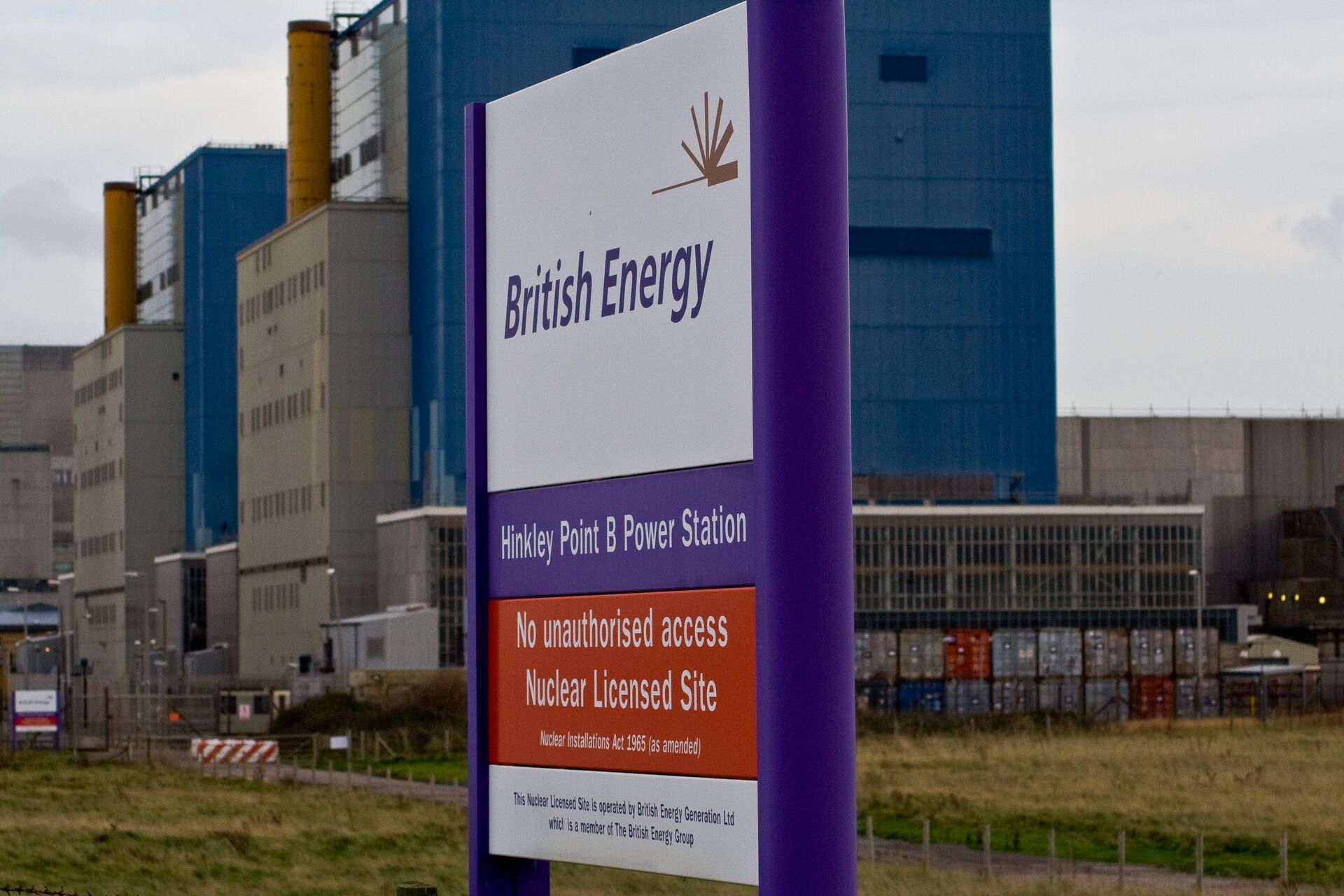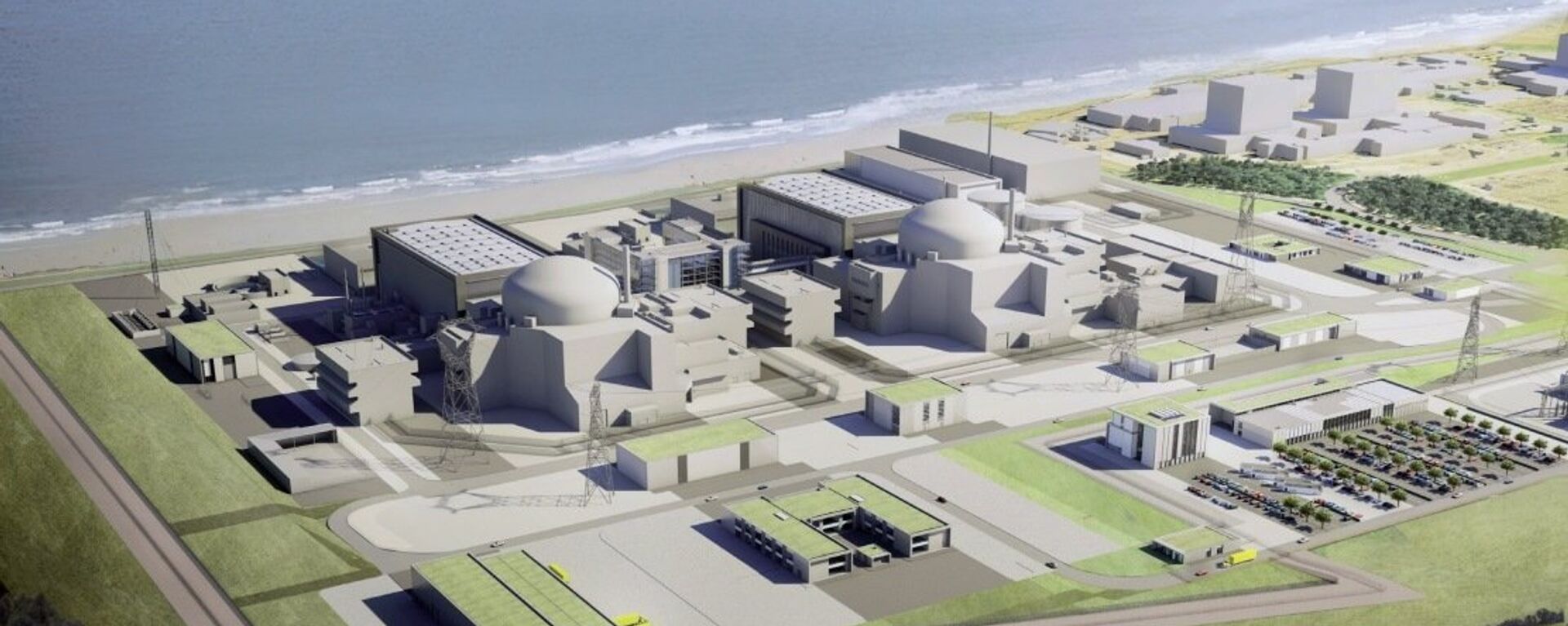https://sputnikglobe.com/20220407/bojo-to-ramp-up-nuclear-power-as-part-of-uks-new-energy-strategy-that-critics-claim-wont-deliver-1094540187.html
BoJo to Ramp Up Nuclear Power as Part of UK’s New Energy Strategy That Critics Claim ‘Won’t Deliver’
BoJo to Ramp Up Nuclear Power as Part of UK’s New Energy Strategy That Critics Claim ‘Won’t Deliver’
Sputnik International
The UK government has been increasingly forced to reassess its energy policies in recent months amid an unprecedented increase in the cost of fossil fuel, with... 07.04.2022, Sputnik International
2022-04-07T06:14+0000
2022-04-07T06:14+0000
2023-05-28T15:18+0000
boris johnson
nuclear power
fossil fuels
united kingdom (uk)
https://cdn1.img.sputnikglobe.com/img/07e6/03/14/1094022258_0:0:3073:1728_1920x0_80_0_0_828cf08ab6256a4785b6e08202800cc7.jpg
After tough political wrangling, UK Prime Minister Boris Johnson is set to announce a reappraised energy strategy that will put nuclear power at the forefront, reported The Guardian.Touted as part of a drive to ensure greater energy security, the plan to build new nuclear power stations has been prompted by a desire to wean Britain off expensive fossil fuels, but has left environmentalists and the opposition fuming.Downing Street, the UK Treasury, led by Chancellor Rishi Sunak, and the Department for Business, Energy, and Industrial Strategy (BEIS), headed by Kwasi Kwarteng, have been engaged in a “row” over the additional funding for nuclear power and energy efficiency measures. The process was slammed as “chaos” by cited Whitehall sources.The Conservative Party was also purportedly split over deployment of onshore wind and fracking for gas. The latter has been on hold since a test well was hit by small earthquakes in 2019.Eventually, the Cabinet reportedly arrived at a compromise presupposing that nuclear energy would form the backbone of the strategy, with an estimated eight new reactors planned. Furthermore, targets for onshore wind and solar power generation will also be raised.Accordingly, the Energy Security Strategy outlines a push for 95 percent of the UK’s electricity to come from domestic renewable energy sources by 2030.The plan to boost domestic energy production presupposes:‘Energy Self-Sufficiency, Cheaper Bills’Speaking at the Department for Business, Energy, and Industrial Strategy, Boris Johnson hailed his government’s new plan as seeking to “reduce our dependence on power sources exposed to volatile international prices we cannot control, so we can enjoy greater energy self-sufficiency with cheaper bills”.Speaking after Britons were hit by a 54 percent rise in the price cap on energy bills as of 1 April, driven by surging wholesale gas prices further exacerbated by the Russian operation to demilitarise and de-Nazify Ukraine, the prime minister added on Wednesday:Currently, the country generates about 16 percent of its power from nuclear power stations, however, all but one of the UK’s 11 reactors at five sites are due to be “retired” by the end of the decade.The “new nuclear” strategy promises to bolster Britain’s energy supply with “reliable, affordable, low carbon power” by developing a thriving pipeline of future nuclear projects. According to Johnson’s government, the ambitious target is to have nuclear power cover around 25 percent of the projected electricity demand.Currently, Electricite de France SA is building a new nuclear power plant at Hinkley Point C, southwest England, which will “provide 3.2 GW of low carbon electricity for around 60 years to power around 6 million homes and provide 25,000 job opportunities”, stated the government.The first reactor is targeted to come online in June 2026.EDF is also said to be considering extending the operating life of its Sizewell B station until 2055.In line with the new strategy, the government will “work to progress a series of projects as soon as possible this decade”, including the Wylfa site in Wales.The government has also been in “constructive negotiations” on the Sizewell C project in Suffolk since January 2021”.UK ministers will be establishing a new government body - Great British Nuclear - to boost new projects, while also setting up a £120 million Nuclear Enabling Fund.A Strategy that ‘Won’t Deliver’The new energy strategy was slammed by the opposition as an approach that “won’t cut bills, won’t deliver energy independence, and won’t tackle the climate crisis”.Ed Miliband, the opposition Labour Party’s spokesman on climate change, said in a statement that the energy policy was “in disarray” and would do little to offset the energy crisis now.Indeed, Cabinet ministers are said to have been split over whether to reform planning laws to boost quicker development of onshore wind farms.UK Transport Secretary Grant Shapps along with chief whip Chris Heaton-Harris were reportedly among a group of MPs who opposed a major rollout of onshore wind in England, while Secretary of State for Levelling Up, Housing, and Communities Michael Gove and Business Minister Kwasi Kwarteng backed the push.Kwarteng’s department’s plan to funnel £300m into a rapid rollout of energy efficiency upgrades, potentially able to bring down homeowners’ energy bills, is believed to have been thwarted by the Treasury.Ed Davey, the Lib Dem leader, was also sceptical regarding the new strategy:According to climate change research group E3G, the focus of the new plans is misplaced, as it emphasises longer-term programmes for nuclear power, offshore oil, and gas and hydrogen.
https://sputnikglobe.com/20220405/uk-energy-secretary-orders-review-of-fracking-ban-amid-self-inflicted-gas-crisis-1094504201.html
https://sputnikglobe.com/20220403/uk-energy-minister-britain-could-build-seven-nuclear-power-stations-amid-energy-independence-push-1094434679.html
united kingdom (uk)
Sputnik International
feedback@sputniknews.com
+74956456601
MIA „Rossiya Segodnya“
2022
Sputnik International
feedback@sputniknews.com
+74956456601
MIA „Rossiya Segodnya“
News
en_EN
Sputnik International
feedback@sputniknews.com
+74956456601
MIA „Rossiya Segodnya“
Sputnik International
feedback@sputniknews.com
+74956456601
MIA „Rossiya Segodnya“
boris johnson, nuclear power, fossil fuels, united kingdom (uk)
boris johnson, nuclear power, fossil fuels, united kingdom (uk)
BoJo to Ramp Up Nuclear Power as Part of UK’s New Energy Strategy That Critics Claim ‘Won’t Deliver’
06:14 GMT 07.04.2022 (Updated: 15:18 GMT 28.05.2023) The UK government has been increasingly forced to reassess its energy policies in recent months amid an unprecedented increase in the cost of fossil fuel, with oil and gas prices surging even more once Western countries began their campaign of sanctions against Russia over its ongoing operation to demilitarise and de-Nazify Ukraine.
After tough political wrangling, UK Prime Minister Boris Johnson is set to announce a reappraised
energy strategy that will put nuclear power at the forefront, reported The Guardian.
Touted as part of a drive to ensure greater energy security, the plan to build new nuclear power stations has been prompted by a desire to wean Britain off
expensive fossil fuels, but has left environmentalists and the opposition fuming.
Downing Street, the UK Treasury, led by Chancellor Rishi Sunak, and the Department for Business, Energy, and Industrial Strategy (BEIS), headed by Kwasi Kwarteng, have been engaged in a “row” over the additional funding for nuclear power and energy efficiency measures. The process was slammed as “chaos” by cited Whitehall sources.
The Conservative Party was also purportedly split over deployment of onshore wind and
fracking for gas. The latter has been on hold since a test well was hit by small earthquakes in 2019.
Eventually, the Cabinet reportedly arrived at a compromise presupposing that nuclear energy would form the backbone of the strategy, with an estimated eight new reactors planned. Furthermore, targets for onshore wind and solar power generation will also be raised.
Accordingly, the Energy Security Strategy outlines a push for 95 percent of the UK’s electricity to come from domestic renewable energy sources by 2030.
The plan to boost domestic energy production presupposes:
Boosting nuclear capacity from 7 gigawatts (GW) to 24GW by 2050.
Raising the offshore wind target from 40GW previously earmarked to 50GW by 2030, and from about 14GW at present.
Solar projects could increase five-fold, to 70GW in capacity by 2035, from 14GW at present.
Fresh licensing to be issued for North Sea oil and gas projects in autumn.
A promise to spearhead an “impartial” review into the “safety” of fracking for shale gas by the British Geological Survey (a moratorium was imposed on the process in 2019).
Generating up to 10GW of hydrogen power by the year 2030.
‘Energy Self-Sufficiency, Cheaper Bills’
Speaking at the Department for Business, Energy, and Industrial Strategy, Boris Johnson hailed his government’s new plan as seeking to “reduce our dependence on power sources exposed to volatile international prices we cannot control, so we can enjoy greater energy self-sufficiency with cheaper bills”.
Speaking after Britons were hit by a 54 percent rise in the price cap on
energy bills as of 1 April, driven by surging wholesale gas prices further exacerbated by the Russian operation to demilitarise and de-Nazify Ukraine, the prime minister added on Wednesday:
“This plan… will be central to weaning Britain off expensive fossil fuels, which are subject to volatile gas prices set by international markets we are unable to control, and boosting our diverse sources of homegrown energy for greater energy security in the long term”.
Currently, the country generates about 16 percent of its power from nuclear power stations, however, all but one of the UK’s 11 reactors at five sites are due to be “retired” by the end of the decade.
The “new nuclear” strategy promises to bolster Britain’s energy supply with “reliable, affordable, low carbon power” by developing a thriving pipeline of future nuclear projects. According to Johnson’s government, the ambitious target is to have nuclear power cover around 25 percent of the projected electricity demand.
Currently, Electricite de France SA is building a new nuclear power plant at Hinkley Point C, southwest England, which will “provide 3.2 GW of low carbon electricity for around 60 years to power around 6 million homes and provide 25,000 job opportunities”, stated the government.
The first reactor is targeted to come online in June 2026.
EDF is also said to be considering extending the operating life of its Sizewell B station until 2055.
In line with the new strategy, the government will “work to progress a series of projects as soon as possible this decade”, including the Wylfa site in Wales.
The government has also been in “constructive negotiations” on the Sizewell C project in Suffolk since January 2021”.
UK ministers will be establishing a new government body - Great British Nuclear - to boost new projects, while also setting up a £120 million Nuclear Enabling Fund.
A Strategy that ‘Won’t Deliver’
The new energy strategy was slammed by the opposition as an approach that “won’t cut bills, won’t deliver energy independence, and won’t tackle the climate crisis”.
Ed Miliband, the opposition Labour Party’s spokesman on climate change, said in a statement that the energy policy was “in disarray” and would do little to offset the energy crisis now.
“Boris Johnson has completely caved to his own backbenchers and now, ludicrously, his own energy strategy has failed on the sprint we needed on onshore wind and solar – the cheapest, cleanest forms of homegrown power”, he said, in a reference to the fact that ministers refused to set targets for onshore wind.
Indeed, Cabinet ministers are said to have been split over whether to reform planning laws to boost quicker development of onshore
wind farms.
UK Transport Secretary Grant Shapps along with chief whip Chris Heaton-Harris were reportedly among a group of MPs who opposed a major rollout of onshore wind in England, while Secretary of State for Levelling Up, Housing, and Communities Michael Gove and Business Minister Kwasi Kwarteng backed the push.
Kwarteng’s department’s plan to funnel £300m into a rapid rollout of energy efficiency upgrades, potentially able to bring down homeowners’ energy bills, is believed to have been thwarted by the Treasury.
Ed Davey, the Lib Dem leader, was also sceptical regarding the new strategy:
“The Conservatives’ failure to help people cut their bills with an urgent energy insulation programme, the failure to back super-cheap onshore wind and the failure to back properly new technologies like tidal power and hydrogen is a total betrayal of families and pensioners across the UK”, he stated.
According to climate change research group E3G, the focus of the new plans is misplaced, as it emphasises longer-term programmes for nuclear power, offshore oil, and gas and hydrogen.
“The focus should have been on rapid measures to boost energy security at home… By instead emphasizing on technologies which won’t deliver until far into the future, the government has both failed to meet the moment, and failed to read the mood of the nation,” E3G Senior Policy Advisor Juliet Phillips was cited as saying.





